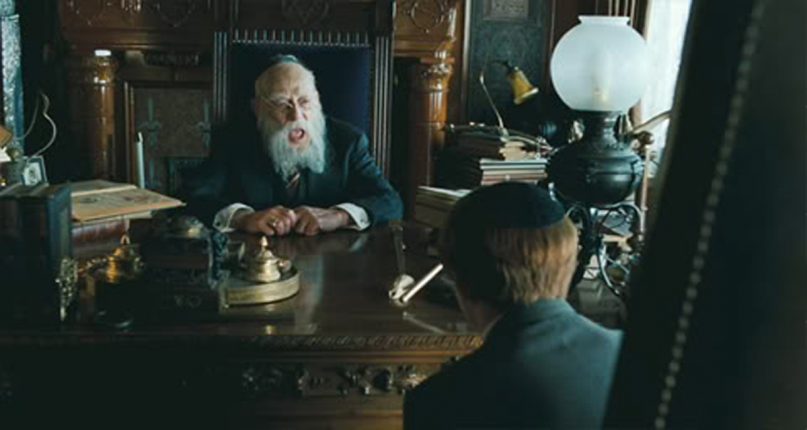This Shabbat is the fiftieth anniversary of Danny Gopnick’s bar mitzvah ceremony.
Um – who?
Danny Gopnick is the son of Larry Gopnick, the main character of the Coen brothers’ film, A Serious Man.
Many critics believe that A Serious Man is a modern midrash on the book of Job, and it is easy to see why.
Larry Gopnick’s life is a mess. He is up for tenure at his university; a student is pressuring him to change a grade; the Columbia Record Club is demanding payment for a subscription that he never ordered; his wife wants a divorce; his tzuris-infested brother is crashing with him; and with all that, his son, Danny, is coming up for bar mitzvah.
So, how do I know that this is the fiftieth anniversary of Danny’s bar mitzvah?
On that Shabbat morning, Danny, pot-addled, ascends to read from the Torah. He reads from this week’s Torah portion, Behar.
Let the historical record note: That Shabbat was right before the outbreak of the Six Day War.
Larry Gopnick is in pure existential despair. He goes to his suburban Minneapolis synagogue, seeking the solace and wisdom of its three rabbis.
The “junior rabbi” is Rabbi Scott Ginzler. When Larry says that his wife wants a divorce, and that she wants him to give her a get, Rabbi Ginzler barely knows what a get is.
Rabbi Ginzler thinks that Larry is “losing track of Hashem.” Larry needs to learn how to see God in the world, and recapture a sense of wonder. God is even present in the synagogue parking lot.
In historical fact, Ginzler’s pablum is anachronistic. No non-Orthodox rabbi would have called God “Hashem” in 1967. In 1967, very few rabbis (with the exception of Abraham Joshua Heschel) were talking about wonder.
No matter. Rabbi Ginzler has nothing to say, nothing to offer, and nothing to teach.
Larry then goes to the older rabbi, Rabbi Nachtner.
Rabbi Nachtner tells him a story about a “goy’s” teeth. A dentist discovers a Hebrew sentence incised on his lower teeth: Hoshieni – “save me!”
It is a meaningless story. Nachtner is saying: God doesn’t owe us any answers — which is what God tells Job “out of the whirlwind,” which makes a guest appearance at the end of the movie, as a tornado threatens
Nachtner might be older and more experienced, but he is no more helpful than his younger colleague.
Finally, Larry tries to see Rabbi Marshak, the oldest rabbi on the synagogue staff. Rabbi Marshak is a figure out of the Old Country – a very old rabbi who speaks with an eastern European accent.
Larry cannot get in to see him. “He’s busy,” the rabbi’s assistant curtly says to him. “He’s thinking.”
Larry’s rabbis have failed him. They have nothing to say. Or, they are inaccessible.
Larry’s son, Danny, is luckier. At the end of the bar mitzvah ceremony, Rabbi Nachtner sends him to Rabbi Marshak’s office for a blessing. (The old rabbi is not at services? How much more remote could he be?)
Danny enters Rabbi Marshak’s office. Compared to the offices of the other rabbis, it is dark, cluttered with arcane scientific specimens, as well as a reproduction of The Binding of Isaac by Rembrandt.
What does Rabbi Marshak say to Danny?
“When the truth is found to be lies, and all the hope within you dies – then what?”
That is a slightly revised quote from the first line of the Jefferson Airplane’s 1967 hit, Somebody to Love. (It’s really “all the joy” that dies).
Rabbi Marshak knows the tradition of quoting a teaching b’shem omro — in the name of the one who has said it.
And so, after he quotes from Somebody To Love, he cites the members of the band (stumbling on the name of Jorma Kaukonen – who has since reclaimed his Jewish ancestry.
Rabbi Marshak concludes: “Be a good boy.”
It is the oldest rabbi – the one immersed in traditional Jewish culture, the rabbi whose very office is a mirror of medievalism – who has the most to teach.
And what does he offer? You would expect that it would be something from the Torah, midrash, Talmud, Maimonides.
No. He knows that Danny’s transistor radio has been confiscated by the religious school administration.
Apparently, the ancient rabbi has listened to the radio, heard the song, and found Torah in its misquoted lyrics.
As it says in Pirke Avot: “Who is wise? The one who learns from all people” – even from popular culture.
This past week, a new crop of rabbis was ordained by Hebrew Union College-Jewish Institute of Religion. Mazal tov to my newest colleagues. I look forward to getting to know you.
The three rabbis in A Serious Man are object lessons to rabbis, and to anyone who cares about religious wisdom.
The way of Rabbi Ginzler — assigning the search for wonder as a panacea to life’s problems — is always tempting. I am not certain that it is correct.
The way of Rabbi Nachtner — telling folksy tales – is always tempting. But if the purpose of the story is to show that God’s ways are beyond our understanding, what good is it?
I prefer the way of Rabbi Marshak. It is the way of being firmly rooted in your tradition, loving it — and being open to the best that contemporary culture has to offer.
And, then — remembering to ask: “Then what?”






